The best building games on PC
Fortify your game library
'Building' is a pretty broad theme. There are a lot of games where you build things, after all, and they can be very different. Helpfully, then, I've split this list of the 20 best building games on PC into four sections, each covering a sub-category of this big, messy genre.
There were some general criteria for inclusion on the list: games had to have some kind of "eye in the sky" camera POV, meaning Minecraft, Space Engineers and suchlike will have to wait for another list. I also left out vehicle construction games like Besiege and Nimbatus, since they felt like their own thing.
RTS games with more emphasis on waging war than base-building, including tower defence games, were (mostly) left out, as well as games in early access. But OTHER THAN THAT, ready your mousewheel for a vigorous scroll, for here are the 20 best building games on PC. (Or cut down on the scrolling with these helpful category links.)
- Cities: Skylines
- Emperor: Rise Of The Middle Kingdom
- Frostpunk
- Anno 1800
- Surviving Mars: Green Planet
- Factorio
- They Are Billions
- Don’t Starve
- Stronghold HD
- Age Of Empires 2 Definitive Edition
- OpenTTD
- Planet Zoo
- Offworld Trading Company
- Planet Coaster
- Prison Architect
- Dwarf Fortress
- RimWorld
- Oxygen Not Included
- Banished
- Rise To Ruins
Best city building games
Games about building cities, where you're working on too grand a scale to care about the individual lives of your ant-like citizens.
Cities: Skylines
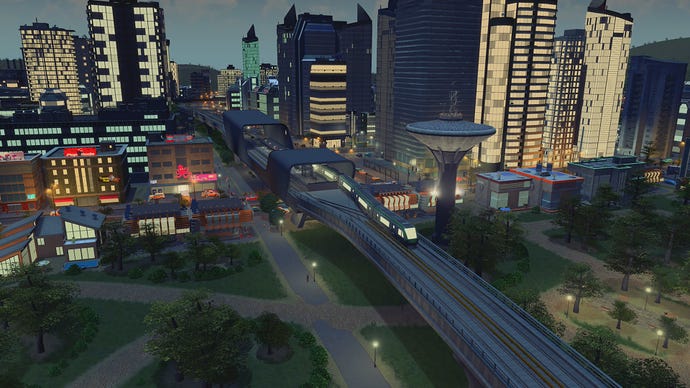
The challenger that became the champion of "realistic" city builders, Paradox's Cities: Skylines grew up in the genre shadow of SimCity, and ended up eclipsing it almost entirely. Skylines nailed so many of the issues crucial to simulating the construction of modern cities, with its suite of road placement and traffic mechanics being something of a masterpiece, and solid systems for zoning, public transport, and all those other things that sound dull on paper but become day-eatingly engrossing once you've gotten stuck in.
C:S is as versatile as they come, with virtually any city design being possible with a bit of thought. If there's a price to pay for this, it's that it's very sandboxy to play, without many definite objectives in sight. But if that's an issue for you, or if you find you've reached your appetite for the possibilities of the base game, there's such a vast catalogue of official DLC and community-built mods, that you're never going to run out of new ways to build.
Emperor: Rise Of The Middle Kingdom
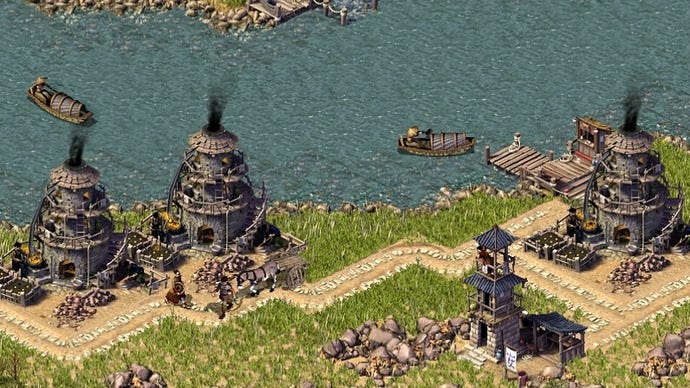
The series of history-themed city builders made by Impressions in the late 1990s are widely seen as one of the high water marks for this entire genre, and that series reached its Zenith with Emperor, a game about constructing cities through thousands of years of Chinese History. And yes, you can build the Great Wall. It's a massive but satisfying endeavour, and there's little more pleasing in my experience of PC gaming, than watching hundreds of little peasants with wheelbarrows, beetling too and fro to fill its enormous timber frames with dirt.
Like older siblings Caesar III, Pharaoh and Zeus, Emperor is all about supplying housing with all the things it needs to get really posh, largely by making sure that "walkers" generated by increasingly fancy service buildings and markets wander past them regularly. There's a knack to this, but the game makes it pretty intuitive to pick up, and there's a great pleasure in using resource-gathering and processing buildings, as well as trade, to get hold of the goodies your increasingly demanding aristocrats need to make it through the day.
Frostpunk
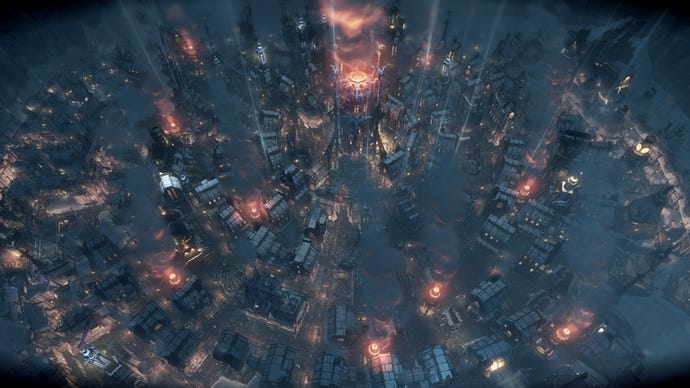
Frostpunk is a gorgeous punch to the gut. You're in a steampunkish, Victorian setting that's so well-realised that it avoids the usual cogs-and-twee-banter cringiness of the subgenre, and you're in big trouble. The world is getting colder and colder at a terrifying rate, and somehow you've got to build a city that can survive it, using whatever manpower you can scrounge from the devastation around you. The sense of dread and desperation is relentless, but that makes the moments of progress and achievement all the sweeter.
It really is beautiful, too. From little touches like the footprints left by workers in snow, to the crackly rime that appears on the UI when it gets really cold, to the immense soundtrack, the level of sensory immersion is wild. There's also a big narrative focus to the game, with a clear story playing out and several events you can pretty much memorise the timing of, and this obviously erodes replay value somewhat. But with several new scenarios released as DLC, and a more sandbox-y Endless Mode to boot, you'll find it's a long time before you grow cold on Frostpunk.
Anno 1800
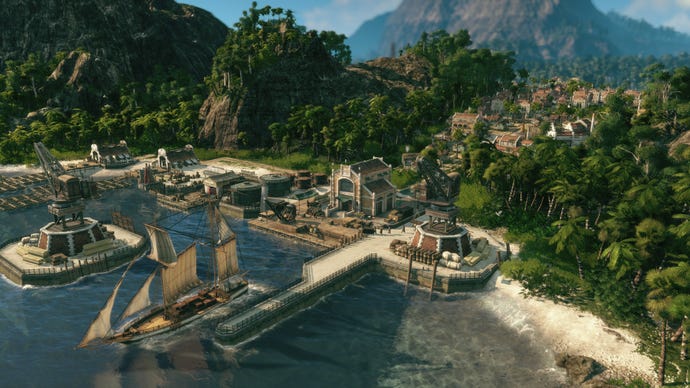
Anno 1800 sees you building cities across multiple islands in - surprise! - the year 1800. The actual city building is solid but not revolutionary, but what makes it special is the fascinating set of mechanics involved in managing settlements at different levels of development across multiple landmasses. And then the real fun starts, as the New World opens up, allowing you to spread onto a whole new map with its own resources and rules.
It's a game that gives you a lot of plates to spin: as well as your multiple settlements, you'll have trade routes to manage, choose-you-own-adventure style quest minigames to play, and even limited RTS naval combat to conduct against AI adversaries and pirates. But once you've got the hang of the pacing, this simply means you'll rarely have a dull moment, or find yourself stuck for something to do while waiting for resources to accrue. It's delightful to look at to boot, with lush beaches strewn everywhere, and cities that are actually worth zooming in to view up close.
Surviving Mars: Green Planet
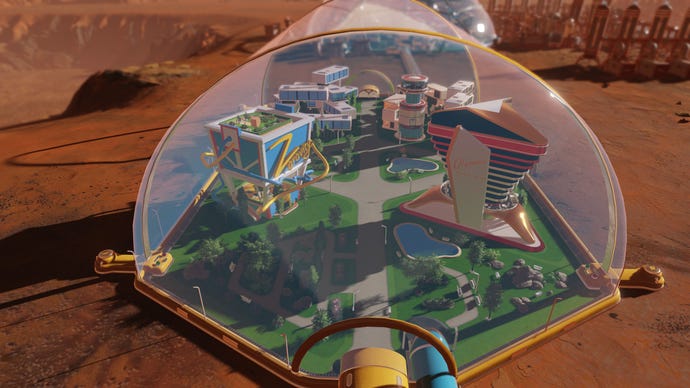
I was lukewarm on the original release of extraterrestrial settlement setter-upper Surviving Mars, but the Green Planet DLC, which restructured the game around a terraforming megaproject, absolutely transformed it for me. If you've ever read the classic science fiction trilogy Red, Green and Blue Mars by Kim Stanley Robinson, you can be assured that this game is as near to an adaptation of those books as exists in modern gaming.
It's the sense of constant, infinitesimal progress that I love. Changing the entire surface of a planet is an eye-wateringly huge job, and so you have to start it when your settlement is tiny and new. At that point, before you've got the wherewithal for massive planetary engineering, it feels like pissing in the wind - but it adds up over time. When you look up from the water management crisis you've been trying to fix for half an hour and see actual green on the landscape, it's magic, and it captures the slow-burn joy of maintaining a garden in the most unexpected way.
Best base building games
Games about building up and fortifying a base in the face of things that want to wreck it.
Factorio
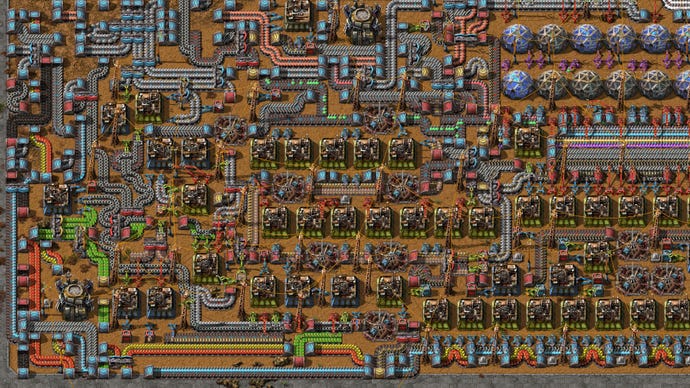
You're not building a city in Factorio. No citizens will call the place you build home, unless you count automated drones, or the waves of rightfully angry insects that will die to its defences. It is a metropolis planned and built by its sole inhabitant - the trudging spaceman you control - and with a single purpose in mind. It's a machine. A giant, mind-meltingly complex machine that will eventually construct a spaceship.
And somehow, through the sheer brilliance of its design, Factorio makes this infinitely less daunting than it should be. The game coaxes you towards this feat of engineering through thousands of tiny increments; minor Eurekae that stack up until you look back at what you've done in all its immensity, and feel like a genius. Be warned, though: it is engrossing. RPS bossman Graham, in fact, sees Factorio as less of a game and more of a curse: a dark bit of magic that makes time vanish without the player ever being aware it has passed. Let the machine suck you in.
They Are Billions
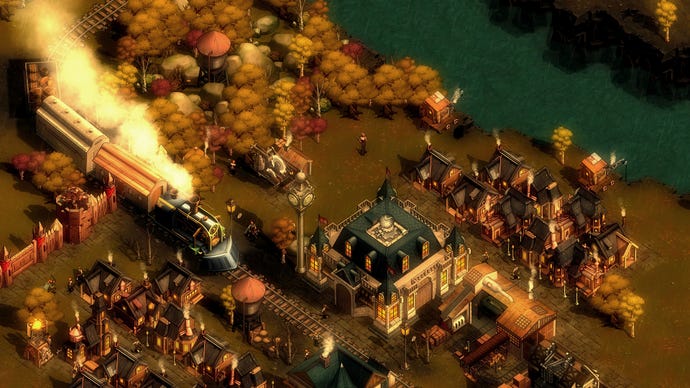
Much like Frostpunk, They Are Billions is a bleak game about fending off overwhelming adversity with Victorian ingenuity, only here the Steampunk is a bit hammier, and instead of the cold, there are a huge, huge, huge number of zombies. They might not actually be billions, but when they rush your base they seem more like a liquid than a mass of individual attackers, so gregarious are they. And of course, the game is largely about building the walls, turrets and soldiers that will stop them from adding your citizens to their big, hungry party.
But it's not just tower defence; you also have to build the economy that will supply the material for your fortifications, house the workers to make it function, and keep them alive and well. What results is a fascinating double-layered game, where you end up playing a robust little city builder, at the same time as you're conducting a titanic, permanent last stand at the outer wall. Two great tastes that go well together, in my opinion.
Don't Starve
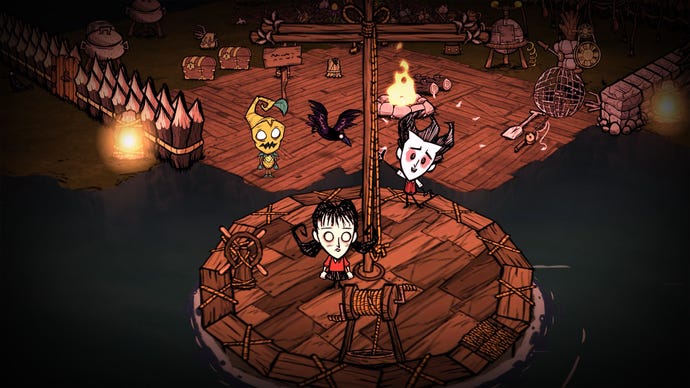
Don't Starve has one of the best titles in the history of games, and it adheres to it ruthlessly. You're some sort of hapless animated character, dumped in a whimsical, paper-cut-out hell wilderness, and your stomach is slowly withering. You must find food, or you will die. You must create light at night, or you will die. You must prepare shelter and warmth for winter... or you will die. Getting the picture yet? The whole experience is a constant, tense battle against entropy, where you feel horribly fragile, and solving any problem creates two more problems. It's ace.
"But it's a survival game!" Well, yes, it is. But then, the key to survival in Don't Starve is the slow and painstaking assembly of a basecamp from things you find scattered in the wilds. It's a crap campfire at first, and maybe a miserable sleeping bag, but eventually there are fridges and rabbit traps and farms, and even weird houses for horrid pig men to live in. It soon takes on the feel of a sort of settlement builder, and you will become immensely proud of the hard-fought-for cluster of hovels and junk that's keeping you alive.
Stronghold HD
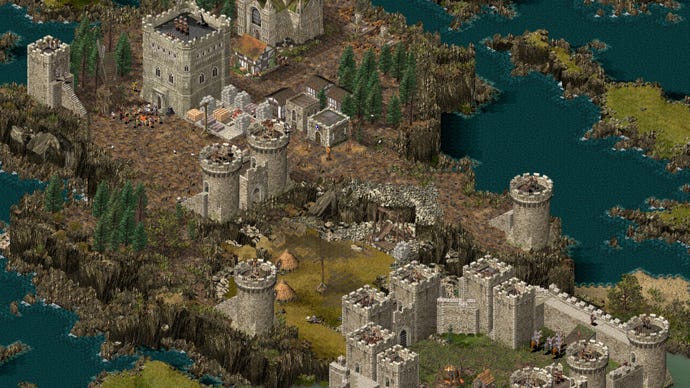
There have been some hits and some misses in the Stronghold series of castle-building RTS hybrids. But especially since its HD remaster job, the original game has stood the test of time as the most solid of the set. It's a game about building a Medieval castle, complete with an economy to keep it running, and an army of soldiers with British regional accents to defend its walls. Then you defend said walls, using all sorts of fun tricks (including pits of tar that can be set alight by flaming arrows!) to keep the oafs and ruffians from your keep.
There are plenty of scenarios included, as well as a multiplayer mode, but the true pleasure of Stronghold is its meaty campaign, which pits you against a number of varied challenges - some buildy, some defendy, and some attacky - with the eventual aim of defeating your nemesis, Wolf Off Of Gladiators. At its best, it's Helm's Deep with stiffly-animated knights instead of orcs, and there's a lot of fun to be had in working out where to put your curtain walls, siege weapons, and nightmarish fire traps.
Age Of Empires 2 Definitive Edition
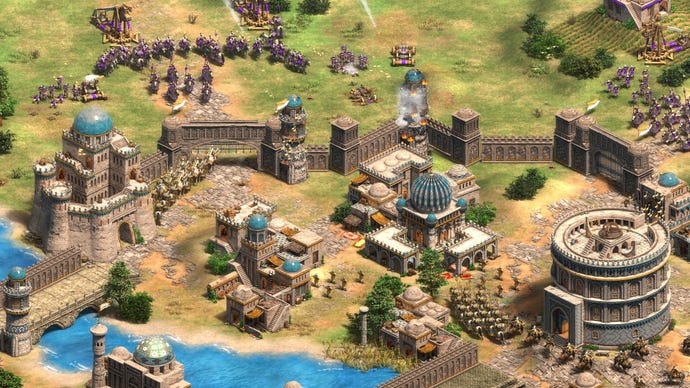
2000’s AoE2 was a cracking strategy game: superbly balanced, perfectly paced, and offering just the right mix of economic and military play. It had a superb scenario editor built-in, a great soundtrack, and a colourful medieval aesthetic that aged at least as well as Starcraft’s space one. Definitive Edition, however, is more than just AoE2’s glammed-up zombie. It’s a giant sexy Frankenstein, with the contents of five separate expansions (four of which were originally made by extremely talented fans, with the latest one made in 2016), and a whole castle full of brand new content, sewn onto the body of the original game.
And yes, I know I said this list wouldn't have any pure RTS games on it. But I love AoE2 so much I had to make an exception. And there's definitely more building involved here than in your average RTS, with placement of castles, walls, towers and production buildings forming a major part of any game. Even if building skills alone won't get you far in AoE2's miraculously revived multiplayer scene, the satisfaction of neatly walling off your settlement and fending off an enemy rush will never get old.
Best tycoon games
Games about building the physical premises of a business, with the aim of making lots of filthy, nasty money.
OpenTTD
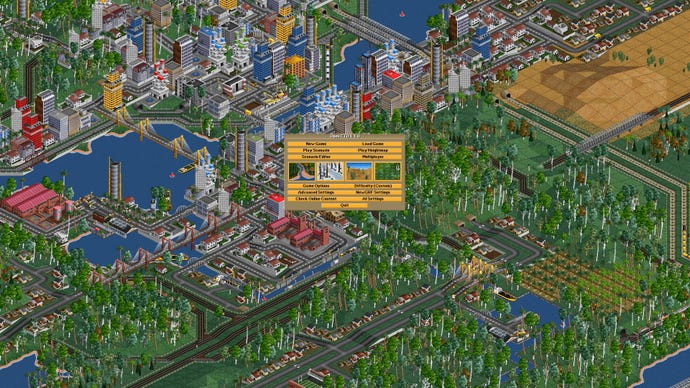
Transport Tycoon Deluxe is as venerable as they come, hailing from good old 1994, and remains a perennial favourite to people who really enjoy building and managing massive logistics operations. And while the original game can't be found on most PC storefronts, that's fine, as it has long been supplanted by OpenTTD - a fan-made successor with bigger maps, LAN support, and the potential for 255-player multiplayer online. That's... a lot of people.
OpenTTD isn't a cut-throat thrill ride: it's as much about sculpting an entire human landscape as it is building train stations and making money. Particularly when you are playing with a horde of other patient, meticulous transport curators, the slow evolution of a map elicits a soothing sort of joy. It's a bit like playing in an orchestra, only with trucks and things instead of music.
Planet Zoo

Planet Zoo features possibly the most beautifully simulated wildlife in the history of games, and considered as a management sim alone, it's a respectable 7.5/10. But where it really shines, and the reason it's on this list, is its phenomenal construction system. Borrowed from Planet Coaster (also on this list), and with a few tweaks and improvements, Planet Zoo's building tools are unmatched.
When I played the game for review, I spent hours upon hours just building landscapes with the map modification tools, before even thinking about animals or tickets. And when I did get round to building facilities for brute-housing, I was delighted to find a huge library of individual components and construction pieces, which could be positioned in any orientation I wanted, and connected any way I pleased. If you can think of an aesthetic, Planet Zoo lets you go through with it, from dingy lion holes built in caves inside an Immortan-Joe-style mesa, to charming, grass-bordered walkways spiralling above a Roman-themed palace for Tortoises. It's remarkable.
Offworld Trading Company
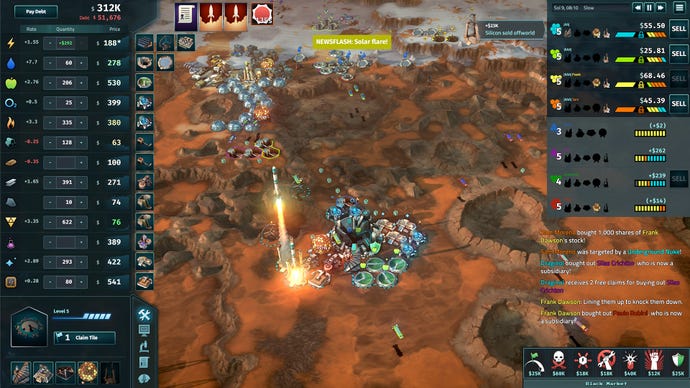
Offworld Trading Company is one of the most cleverly designed games I've played. As the name suggests, it puts you in the shoes of a business attempting to exploit the boundless riches of the solar system, and competing with a pack of other maniacs trying to do the same thing. Everything in OTC is built on a beast of a simulated commodities market, and success is entirely driven by how well, and quickly, you can spot and exploit opportunities in its frantic fluctuations. There are loads of juicy mineral extractors to build, and drones to watch ferrying delicious goods between your various coin-production domes.
There are dozens of excellent, puzzly scenarios to take on, but the multiplayer mode is where it excels. Without a single laser being fired, it manages to offer some of the most hectically competitive action in the whole strategy genre, and has the feel of a fighting game generated entirely from the gestalt wank fantasies of Elon Musk and Jeff Bezos.
Planet Coaster
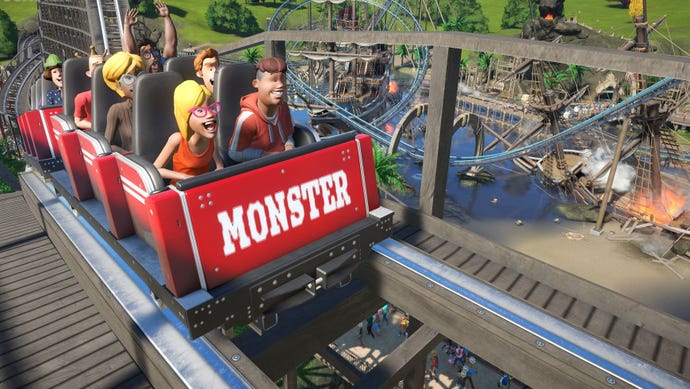
Planet Coaster is not, thankfully, about cornering the market for circular discs on which to rest drinks. It's a game about building a theme park, and approaches the brief as emphatically as Planet Zoo approaches its own. What's great about it, too, is that once you've built your rollercoasters, you can ride 'em. There's a Ghostbusters DLC too, with Dan Aykroyd in it! And actual, real ghosts. It's bizarre, but great.
Management-wise, it plays pretty well - but again, like its beastly brother, it's much more about design and aesthetics than it is about bookkeeping. And if you're lacking in inspiration, or just want to save yourself a truckload of time in construction, there's a galaxy of beautiful, monstrous and baffling blueprints built by other people, and available through the Steam Workshop.
Prison Architect
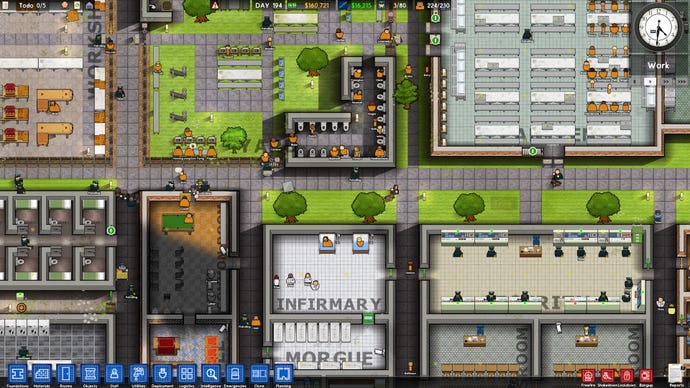
I've got to say, upfront, that I'm a bit conflicted on Prison Architect. Even though the game is well aware of the grim territory it exists in, and has some well-thought-out satire to it, I'm just not sure that it is possible, at this point in time, to make an intermittently goofy, fun game about the prison-industrial complex without a hefty slice of yikes.
But, objectively speaking, Prison Architect is a really fun game. Rightly or wrongly, a prison is a brilliant setting in which to deploy the mechanics of a building game, as walls and towers must be built, cell blocks must be adapted to the needs of their inmates, and schedules must be managed to lessen the odds of canteen shiv wars. Prisons can be tiny hypermax facilities incarcerating a handful of Banes, or sprawling, relatively lax facilities aimed ostensibly at rehabilitation. Plus there's a mode where you can play as a random prisoner and try to escape from your own, or others', creations. But yeah, prisons. Not a laugh.
Best colony sim games
Games about building smaller settlements, with a big focus on the lives of their weird, needy residents.
Dwarf Fortress
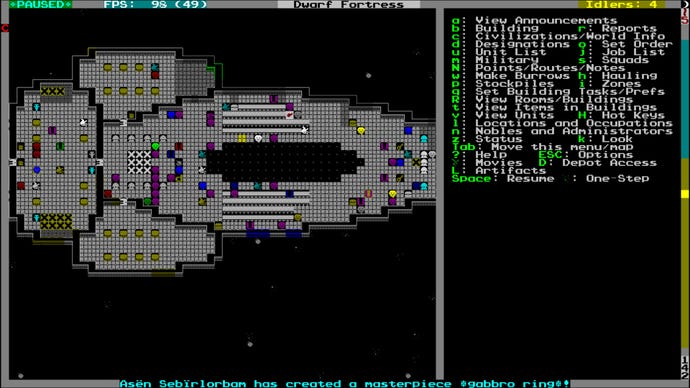
Dwarf Fortress is my favourite game of all time. And it's one of the best building games there is, even though its entirely laid out in faux-ascii, as letters and punctuation marks on a black background. Hell, it's not even meant to be a building game - it's really a fantasy world simulator, designed for creating mind-blowing emergent narratives from the modelled interactions of uncountable numbers of dwarves, elves, humans and god-knows-how-many varieties of animal person. It just so happens to have set the gold standard for colony sims as a bloody side effect of that, such is the power of developer Tarn Adams' mind.
Dwarf Fortress is being remade for Steam at present, with much prettier visuals, mouse support, and all sorts of things that will make it more accessible to newcomers. If you're afraid to take the plunge until then, why not read through The Basement Of Curiosity, and see what this once-in-a-lifetime game is capable of.
RimWorld
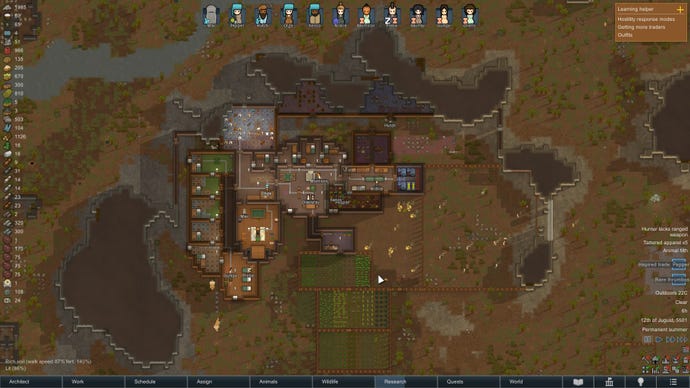
Having said that many games have tried to be like Dwarf Fortress and fallen short, there is one game inspired by it which did enough of its own thing to become something different and wonderful. That game is RimWorld. Like DF, it's about making stories: tales about simulated people with heads full of quirks, living together in the fraught confines of a fledgling settlement. But in your role as a sort-of-god, you do the settlement-building, and that element of the game is a triumph in its own right - and much easier to get your head around than DF, in fairness. I don't know why, but few things in games feel as good as laying down carpets in RimWorld.
Another feather in RimWorld's cap is its recent Royalty expansion, which has added even more toys to play with, including deranged aristocrats, psychic powers, and self-assembling, hostile mechanoid hives. The game always had a strange, lovely atmosphere halfway between Dune and a space western, and with the lore and colour introduced in Royalty, its science fiction stories are just that bit more juicy.
Oxygen Not Included
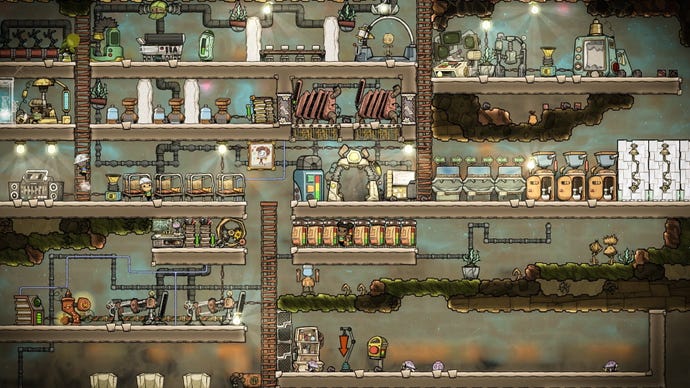
Oxygen Not Included may look cute, with Klei Entertainment's unmistakable art style bleeding over from Don't Starve. But don't be fooled. This side-on colony simulator, about trying to carve out a toehold for a bunch of hapless astronauts ('dupes') trapped in the centre of a giant asteroid, is a cruel, cruel game. It's absolutely packed with ruthlessly simulated environmental factors, from gas flows to temperature modelling, and while they're not necessarily "realistic", they are at least internally consistent, forming their own, mean, shadow version of the laws of physics.
Much like Don't Starve, the clue to how ONI plays is in its name. Keeping your dupes alive will mean finding sources of oxygen for them to breath, let alone feeding them, stopping them freezing or roasting, and finding places to store their piss. Long-term sustainability is all about making constant nudges to systems veering slowly away from temporary equilibrium, and there's a stressfully brilliant "hole in my bucket" feel to it, where solving any major catastrophe will involve solving several seemingly unconnected problems first, with each fix seeding a future catastrophe of its own. Relaxing stuff.
Banished
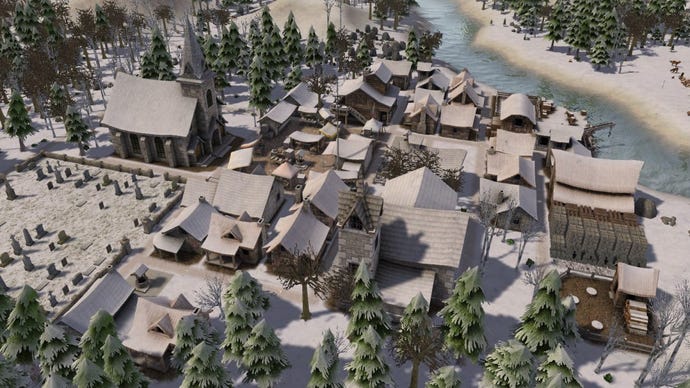
Banished looks a bit like it might be a game in the vein of the old Settlers franchise: rustic, mellow, and pleasantly ant-farmy. It's not. Banished is the ghost at the LARP feast, reminding us all why living in the middle ages was almost universally horrendous, rather than a bucolic lark in furs and chainmail. Building your settlement here is less about an inevitable upward trajectory into cityhood, and more about clinging on for survival's sake.
It's not mosntrously hard, once you get the hang of it. But it's not forgiving while you're in the process of learning, and there's something refreshingly different about having every single soul in your village starve to death in spring because you beefed it during last year's apple harvest. And hey, that sudden "oh, they're dead" feeling has a great upside - because when you do manage not to cock up, and you see your village actually hobbling along in relative comfort, you feel like a benevolent and capable god.
Rise To Ruins
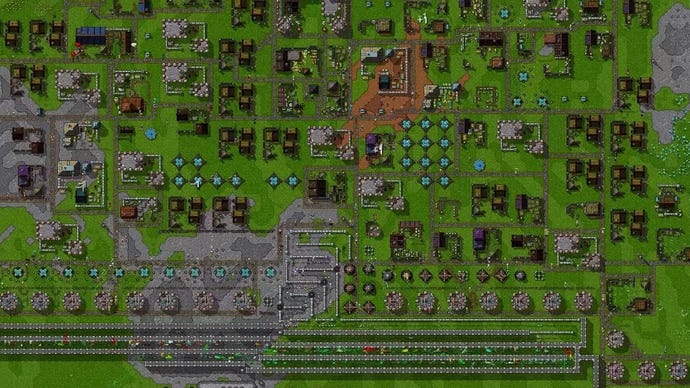
Rise To Ruins is one of those games that isn't technically in early access, but is ever evolving through meaty content updates. Its general shape, however, is that of a top down town builder on the prettier end of the pixel art spectrum, with an absolute bastard of a difficulty curve. Laid-back lumberjacking segues into a last-ditch defence against floods of ghosts and skeletons faster than you'd expect, and possibly more than any of the games in this section of the list, Rise To Ruins takes the Doctor No approach to victory, in that it expects you to die.
Still, RTR now has a more chill, building-focused difficulty setting - albeit one I've not had a go with yet - so it doesn't have to get all Super Ghouls And Gits if you don't want it to. And there are ways to cheese the game even on harder settings, once you know all its tricks. With that said, I rather liked it on the classic setting, where I treated it like the final level of Halo: Reach, and enjoyed the slow, iterative process of creating increasingly impressive failures.


